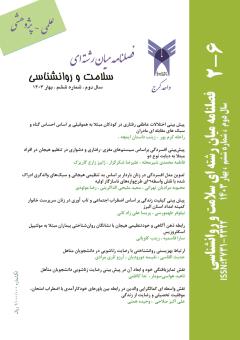پیش بینی اختلالات عاطفی رفتاری در کودکان مبتلا به هموفیلی بر اساس احساس گناه و سبک های مقابله ای مادران. (نویسندگان : راحله کرم پور / زینب داستان ایمچه)
محورهای موضوعی : روانشناسی بیماری های مزمن
1 - مدیر کلینیک روانشناسی کودک و نوجوان ، دانشکده پزشکی ، دانشگاه آزاد اسلامی کرج
کلید واژه: اختلالات عاطفی رفتاری در بین کودکان مبتلا به هموفیلی – احساس گناه- سبک ای مقابله ای کنار آمدن,
چکیده مقاله :
چکیده: هدف پژوهش حاضر پیش بینی اختلالات عاطفی رفتاری در کودکان مبتلا به هموفیلی بر اساس احساس گناه و سبک ای مقابله ای مادران بود. به منظور دستیابی به اهداف پژوهش از میان کودکان مبتلا به هموفیلی و مادران آنها که به درمانگاه جامع هموفیلی استان تهران مراجعه کرده بودند نمونه ای به حجم 100 نفر با روش نمونه گیری در دسترس انتخاب شدند. ابزارهای گردآوری اطلاعات پرسشنامه CBCL، پرسشنامه احساس گناه و پرسشنامه سبک های مقابله ای کنار آمدن بوده و روش تحلیل داده ها بصورت معادلات ساختاری انتخاب شده بودند. نتایج پژوهش نشان داد که بین احساس گناه و سبک های مقابله ای کنار آمدن ( بعد حفظ انسجام خانواده) در ایجاد اختلالات عاطفی رفتاری در کودکان هموفیلی تفاوت معنادار وجود داشت. نتیجه گیری: بنابراین بر اساس یافته های این پژوهش می توان نتیجه گرفت احساس گناه به صورت مثبت و معنادار اختلالات عاطفی رفتاری را در کودکان هموفیلی و از بین سبک های مقابله ای کنار آمدن، سبک حفظ انسجام خانواده بصورت منفی و معنادار اختلالات عاطفی رفتاری را در کودکان مبتلا پیش بینی کرده است.
Abstract: The aim of the present study was to predict emotional and behavioral disorders in children with hemophilia based on mothers' guilt feeling and coping style. In order to achieve the objectives of the research, a sample of 100 people was selected from among the children with hemophilia and their mothers who had visited the comprehensive hemophilia clinic in Tehran province using available sampling method. The data collection tools were the CBCL questionnaire, the guilt questionnaire and the coping styles questionnaire, and the data analysis method was selected as structural equations. The results of the research showed that there was a significant difference between guilt and coping styles (maintaining family cohesion) in causing emotional and behavioral disorders in hemophiliac children. Conclusion: Based on the findings of this research, it can be concluded that guilt has a positive and significant effect on emotional and behavioral disorders in hemophiliac children, and among coping styles, the style of maintaining family cohesion has a negative and significant effect on emotional and behavioral disorders. predicted in affected children.
منابع
آرونستم، آ. خونریزی و بیماران هموفیلی،(ترجمه عبدالحمید جهان مهر،1381). تهران: موسسه فریاد کلام.
حیدری ،احمد ؛ دهقانی ، مهدی.(1391). بررسی تاثیر یک برنامه درمانی روی فاکتورهای جسمانی و روانی افراد مبتلا به هموفیلی. مقاله علمی پژوهشی .سال سوم .شماره13.
رجایی، ع.، خوینژاد، غ.، جوانمرد، ج.، و عبدالهپور، م. (1394). رابطه ی حالت های روان شناختی مثبت با سبک های مقابله ای. اصول بهداشت روانی، 70(18)، 57-63.
زارع، مریم؛ شعبانی، حسین.(1386). مراقبت از کودک هموفیلی. دوره 4. شماره3: 16-11.
زارع ،حسین ؛ شعبانی ، زهرا .(1392). بررسی اثر بخشی آموزش مراقبت از بیماران هموفیلی در کاهش احساس گناه ، افسردگی و اضطراب مادران. دوره 5، شماره15: 10-2.
عسگرپور،حسین؛محمدی،عیسی؛معماریان،ربابه.تاثیر برنامه خودمراقبتی برکیفیت زندگی نوجوانان مبتلا به هموفیلی، سال سوم، دوره 14،شماره 69س :12-1.
کامکار، منوچهر؛ مولوی، حسین. (1385). تاثیر ارائه الگوهای موفق تحصیلی اجتماعی هموفیلی بر میزان افسردگی و اضطراب نوجوانان هموفیلی استان اصفهان، دوره 7، شماره2: 13-1.
مطهریان، الهه؛ ضیاعی، مسعود؛محمودی راد، علیرضا.(1381). بررسی سبکهای مقابله ای در مراقبان اصلی دارای فرزند مبتلا به هموفیلی. دوره 6.شمار 3: 13.
معاونت آموزش و پژوهش بنیاد امور بیماریهای خاص. (1381). هموفیلی چیست. ناشر: ریحانه نبی (ص)
ملک شاهی، فرید. (1380)، بررسی مشکلات روانی و رفتاری بیماران هموفیلی مراجعه کننده به بیمارستان مدنی خرم آباد، فصل نامه اصول بهداشت روانی، سال سوم، شماره 12و11: 121-115.
Abali O, Zülfikar OB, Karakoç Demirkaya S, Ayaydin H, Kircelli F, Duman M. An
examination of the symptoms of anxiety and parental attitude in children with
hemophilia. Turk J Med Sci. 2014;44(6):1087-90. doi: 10.3906/sag-1310-82. PMID:
25552165.
Aaron Resch, J, Gerardo Mireles, Michael R. Benz, Cheryl Grenwelge, Rick Peterson, Dalun Zhang. (2010). Giving Parents a Voice: A Qualitative Study of the Challenges Experienced by Parents of Children With Disabilities. Rehabilitation Psychology, Volume 55, Issue 2,, Pages 139-150.
Anolli, L., & Pascucci, P.2005. Guilt and guilt-proneness, shame and shame-proneness in Indian and Italian Young adults. Personality and Individual Differences, 39, 763-773.
Antony, M. M., Purdon, C. L., Huta, V., Swinson, R. P. 1998. Dimensions of perfectionism across the anxiety disorders. Bevav. Res. Ther. 36, 1143-1154.
Baker, B. L., Blacher, J., Crnic, K., & Edelbrock, C. (2002).Behavior problems and parenting stress in families of three years-old children with and without developmental delays. American. Journal on Mental Retardation, 107, 433–444.
Barret, K. C. 1998. "A functionalist approach to shame and guilt". In J. P. Tangney and K. W. Fischer, Self Conscious Emotion: Shame, Guilt, Embarrassment and Pride. New York: Guilford, pp. 25-63.
Bradford, Y. (1997). Psychological well-being and coping in mothers of youths with Down syndrome, or Fragile X syndrome. American Journal of mental Retardation, 109(3), 254-237.
Campbell, J. D., & Di Paula, A. 2002. Perfectionism self-beliefs: Their relation to personality and goal pursuit. In G. L. Fleet & P. L. Hewitt (Eds.), perfectionism: Theory, research, and treatment (pp. 181-198). Washington, Dc: American psychological Association.
Chang, E. C., & Rand, K. L. 2000. Perfectionism as a predictor or subsequent adjustment: Evidence for a specific diathesis-stress mechanism among college students. Journal of counseling psychology, 47, 129-137.
Chang, E. C., Sanna, L. J., 2001. Negative attributional style as a moderator of the link between perfectionism and depressive symptoms: preliminary evidence for an integrative model. J. Couns. Psychol. 48, 490-495.
Chiu AS, Blanchette VS, Barrera M, Hilliard P, Young NL, Abad A, Feldman BM.
Social participation and hemophilia: Self-perception, social support, and their
influence on boys in Canada. Res Pract Thromb Haemost. 2021 Nov 30;5(8):e12627.
doi: 10.1002/rth2.12627. PMID: 34877447; PMCID: PMC8633242.
Cook, L. C., & Kearney, C. A. 2009. Parent and youth perfectionism and internalizing psychopathology, personality and individual differences, 46, 325-336.
Cookle, Kearney C. A. 2009. Perfectionism and Internalizing Psychopathology. Pers Individ Dif. 46: 325-30
Dover S, Young NL, Blanchette VS, Klaassen RJ, Chan AK, Wakefield C, Bouskill
V, Carcao M, Belletrutti M, Bruce AAK, Price VE. Measuring the impact of
hemophilia on families: Development of the Hemophilia Family Impact Tool
(H-FIT). Res Pract Thromb Haemost. 2021 May 7;5(4):e12519. doi:
10.1002/rth2.12519. PMID: 34013152; PMCID: PMC8114030.
Danielle, S. M., Dana, L. R., Neil, A. E., Stan, W. S., Nancy, H. D. 2006. A mediated of perfectionism, affect, and physical health. J Res Psychol, 40: 482-500.
Doğan, M. (2010). Comparison of the parents of children with and without hearing loss in terms of stress, depression, and trait anxiety. International Journal of Early Childhood Special Education (INT-JECSE), 2,232–246.
Dunkley, D. M., & Blankstein, K. R.2000. Self-critical perfectionism, coping hassles, and current distress: A structural equation modeling approach. Cognitive therapy and research, 24, 713-730.
Englbrecht, M., Psych, D., Gossec, L., DeLongis, A., Scholte, M., Sokka, T., Kvien ,T. K., & Schett, G.(2012). The Impact of Coping Strategies on Mental and Physical Well-Being in Patients with Rheumatoid Arthritis. Seminars in Arthritis and Rheumatism, 41(4), 545–555.
Esdaile, S. A., & Greenwood, K. (2003). A comparison of mother’s and father’s experience of parenting stress and attributions for parent–child interaction outcomes. Occupational Therapy International, 10, 112–115.
Furlan R, Krishnan S, Vietri J. Patient and parent preferences for
characteristics of prophylactic treatment in hemophilia. Patient Prefer
Adherence. 2015 Nov 23;9:1687-94. doi: 10.2147/PPA.S92520. PMID: 26648701;
PMCID: PMC4664548.
García-Ripoll M, De la Corte-Rodríguez H. Disability and the social impact of
hemophilia. Blood Coagul Fibrinolysis. 2023 Jun 1;34(S1):S26-S28. doi:
10.1097/MBC.0000000000001207. PMID: 37254728.
Gilbert, P. & Miles, J. 2000. Sensitivity to put-down; it's relationship to perception of social rank, shame, social anxiety, depression, anger, and self-other blame, Personality and Individual Differences, 29, 757-774.
Goswick, R. A., & Jones, W. H. 1981. Loneliness, self-concept, and adjustment. Journal of Psychology, 107, 226-237.
Jordan, C. H., Spencer, S. J., Zanna, M. P., Hoshino-Browne, E., & Coreel, J. 2003. Secure and defensive high self-esteem. Journal of Personality and social Psychology, 85, 969-978.
Joseph, M.D.Knowledge and health practices among the hemophilia in the united states, Journal of psychology. (1982)vol.32.4:345-368
Michie, S. 2009. Pride and gratitude: How positive emotions influence the prosocial behaviors of organizational leaders. Journal of leadership organizational studies, 15, 393-403.
Miller, R., Sabin, C. A., Goldman, E. Clemente, C., Sadowski, Taloorl, H., & Leei, C. A. (2000). Coping styles in families with hemophilia. Psychology, Health& Medicine, 5, 1: 12-3.
Pinto PR, Paredes AC, Pedras S, Costa P, Crato M, Fernandes S, Lopes M,
Carvalho M, Almeida A. Sociodemographic, Clinical, and Psychosocial
Characteristics of People with Hemophilia in Portugal: Findings from the First
National Survey. TH Open. 2018 Feb 14;2(1):e54-e67. doi: 10.1055/s-0038-1624568.
PMID: 31249930; PMCID: PMC6524863.
Sikora, D., Moran, E., Orlich, F., Hall, T. A., Kovacs, E. A., Delahaye, J. . . . Kuhlthau, K. (2013). The relationship between family functioning and behavior problems in children with autism spectrum disorders. Research in Autism Spectrum Disorders, 7(2), 307-315. doi:https://doi.org/10.1016/j.rasd.2012.09.006
Towe-Goodman, N. R., & Teti, D. M. (2008). Power assertive discipline, maternal emotional involvement, and child adjustment. Journal of Family Psychology, 22,648–651.
Vannata, Robert, B. Social Emotional and Behavioral functioning of children
with hemophilia. (2002).vol.22.4:1205-1245.
Van Meurs, I., Reef, J., Verhulst, F. C., & Van Der Ende, J. (2009). Intergenerational Transmission of Child Problem Behaviors: A Longitudinal, Population-Based Study. Journal of the American Academy of Child & Adolescent Psychiatry, 48(2), 138-145. doi:https://doi.org/10.1097/CHI.0b013e318191770d
Zengin Ersoy G, Ertekin M, Dikme G. Hemophilia Caregiver Burden in a Low
Socioeconomic Region of Turkey. Turk Arch Pediatr. 2023 Nov;58(6):618-624. doi:
10.5152/TurkArchPediatr.2023.23129. PMID: 37818843; PMCID: PMC10724745.

